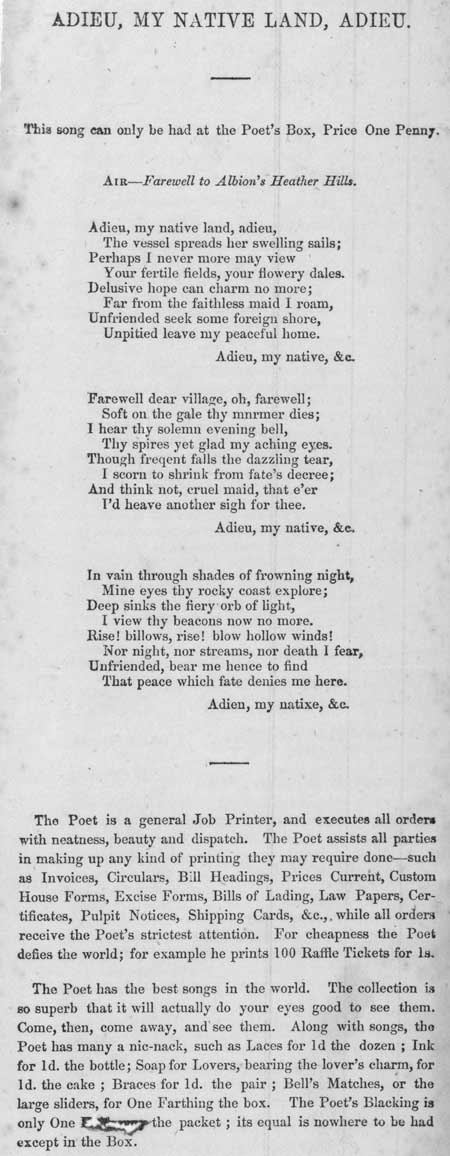Commentary
This ballad begins: 'Adieu, my native land, adieu, / The vessel spreads her swelling sails; / Perhaps I never more may view / Your fertile fields, your flowery dales.' It was to be sung to the air 'Farewell to Albion's Heathery Hills'. The broadside was priced at one penny and published by the Poet's Box (probably in Glasgow). A long advertisement for services offered by the Poet's Box foots the sheet, but the address and town are not included. Parting was a popular theme for ballads. In some cases the parting might be between two people, in others, as in this ballad, the narrator might be leaving his or her native country. Military service, transportation or emigration for economic reasons were the most common reasons for people leaving. In this ballad, however, none of these factors are touched upon, and the atmospheric last verse hints that the journey symbolised here is the final journey of death.
The Poet?s Box in Glasgow operated from 1849 to 1911. Matthew Leitch was the proprietor at 6 St. Andrew Lane?s, a narrow street on the south side of Gallowgate, from 1850 to 1858. His son William Munsie Leitch worked at the same address from 1859 to 1865 and at varous addresses in London Street until 1911. Many of the broadsides published by the Glasgow Poet?s Box were dated and some carried advertisements, not just for printed items but also for shoe blacking and ?soap for lovers?! Like the other ?boxes? in Dundee and Edinburgh, the Glasgow one sold love songs, sea shanties, parodies and dialogues. It is not clear what the connection between the different Poet?s Boxes were. They almost certainly sold each other?s sheets. It is known that John Sanderson in Edinburgh often wrote to the Leitches in Glasgow for songs and that later his brother Charles obtained copies of songs from the Dundee Poet?s Box. There was also a Poet?s Box in Belfast from 1846 to 1856 at the address of the printer James Moore, and one in Paisley in the early 1850s owned by William Anderson.
Early ballads were dramatic or humorous narrative songs derived from folk culture that predated printing. Originally perpetuated by word of mouth, many ballads survive because they were recorded on broadsides. Musical notation was rarely printed, as tunes were usually established favourites. The term 'ballad' eventually applied more broadly to any kind of topical or popular verse.
View Transcription | Download PDF Facsimile
|
 |
Probable period of publication:
1870-1890 shelfmark: L.C.1269(177b)
 View larger image
View larger image
|


